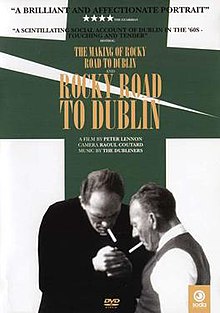Rocky Road to Dublin (film)
| Rocky Road to Dublin | |
|---|---|
 |
|
| Directed by | Peter Lennon |
| Starring |
Seán Ó Faoláin Conor Cruise O'Brien John Huston Father Michael Cleary |
| Cinematography | Raoul Coutard |
|
Release date
|
|
|
Running time
|
69 minutes |
| Country | Ireland |
| Language | English |
Rocky Road to Dublin is a 1967 documentary film by Irish-born journalist Peter Lennon and French cinematographer Raoul Coutard, examining the contemporary state of the Republic of Ireland, posing the question, "what do you do with your revolution once you've got it?" It argues that Ireland was dominated by cultural isolationism, Gaelic and clerical traditionalism at the time of its making.
A brief sketch of Irish history since the Easter Rising of 1916 is drawn, in which the hopes of the revolutionary founders of the Irish Free State for a republican society are dashed. The writer Seán Ó Faoláin argues that what emerged was a society of "urbanized peasants" without moral courage who observed a self-interested silence in a "constant alliance" with an "obscurantist" and "uncultivated" church.
The film covers the continuing dominance of the Anglo-Irish aristocracy with scenes of hunting and equestrian events. The country's lack of independence from American foreign policy is touched on; Conor Cruise O'Brien is critical of Ireland's following of American policy in the United Nation's General Assembly since 1957, and argues that Ireland should follow Sweden's more independent lead.
The Editor of The Irish Times, Douglas Gageby, is in favour of open debate over the contraceptive pill in the correspondence columns of his newspaper, and reflects on the emerging difficulties of censorship. He points out the difficulties of the older generation adapting to change, while people under thirty are more positive. Students at Trinity College, Dublin though, are critical of the Irish media, including The Irish Times.
A policy of the 500,000 strong Gaelic Athletic Association, finally dropped in 1971, is discussed. This was for the suspension of members found to have watched or participated in the foreign, or more precisely the 'English', sports of soccer, cricket, rugby and hockey. The ban applied to clubs whose activities included these pastimes.
...
Wikipedia
